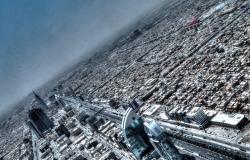Why the Saudis Want Nuclear—And Will Get It

Scott L. Montgomery explores the Kingdom's nuclear ambitions.
Much has been made in recent weeks about the Trump Administration’s attempted nuclear trist with the Saudis. Talk of typical skullduggery by Trump and “his cronies” has aimed at the transfer of “sensitive US nuclear technology” without any mention of what that “technology” is or might be. Should we be scared, very scared, or not?
But let’s start at the beginning. All of this needs context. Why do the Saudis want nuclear power? Is it just so they can make a bomb to counter Iran, whenver they feel the need? Don’t they have more than enough oil and gas for power generation?
In the 1970s and again in the early 2000s, Iran claimed a need for nuclear to help meet surging demand for electricity. The U.S., which helped plant the original idea, later on dismissed it as a ruse. In the Bush Administration, Dick Cheney, with his characteristic scar-like scowl, scoffed that the country was so rich in natural gas that any such claim was bogus on its face. Yet today Iran continues to abide by the nuclear deal (that the U.S. violated under Trump) and is having its second civilian power reactor built, with a third planned, both using Russian technology. These three will generate at least 10% of the country’s power, and Iran has plans for more.It turns out (better sit down) that the country doesn’t want to burn up its major exports after all.
There is little doubt that that Iran wanted a weapon too. Nor should it be ignored that the country has sponsored acts of terrorism and now threatens stability in the region with its expansions into Syria, Iraq, Yemen, Afghanistan. Non-proliferation experts may point out that its leadership feels a need to counter Israel, where sits an arsenal of 80 or more nuclear weapons. Another threat has been the U.S. itself, which, over has often spoken affectionately of attacking Iran in one form or another (“Bomb bomb bomb, bomb bomb Iran” sung with campaign finesse by John McCain in his 2008 run for president). And there is a third possibility for the leadership to be concerned about. But more on that in a moment.
UAE and the Golden Nuclear Standard
The Saudis, meanwhile, have had their eyes on another project just across the Gulf. This is the four-reactor program under construction in the United Arab Emirates at Barakah. These are advanced light-water reactors being built by the South Koreans, who will have an equity stake, with operational expertise and training by the French company EDF. Unit 1 is complete and will go online at the end of 2019 or early 2020, with Unit 2 essential completed and in test phase. Unit 3 is nearly 90% complete, with the entire project 91% finished. It’s expected that all four reactors will be online by mid-late 2020s. They are expected to generate as much as 25% of the country’s power, a major amount for such a small number of units, and all of it non-carbon.
In terms of actual construction, all four plants are being completed on time and without any major cost overruns, to the highest specifications set by the global nuclear community. This last, along with related training needs, have delayed Unit 1 start up by a couple of years, which is unsurprising given these are first-of-kind reactors in the region and repeated inspections and evaluations have been performed to ensure excellence (by comparison, nearly all the LNG megaprojects underway in Australia are 18 months or more delayed). The UAE has long-range plans for 10 more reactors, which would bring their total to 14. For over a decade, it has been importing natural gas because its own production hasn’t kept up with demand, and it doesn’t want to burn its oil too.
So, yes, the Saudis do have an actual economic reason to build nuclear power plants. And their goal for 16 reactors is only two more than the UAE, while Iran’s stated plans include 12 in total. Other nations with declared nuclear plans thus far include Egypt (4 reactors), Jordan (1), and Turkey (12, with one under construction). Most of these countries intend to support several different reactor technologies for different locations (Turkey, for example, has the idea of using Japanese technology for a plant in the north part of the country, where earthquakes are more common). Saudi Arabia has shown interest in a high temperature, gas-cooled design being developed in China (no water cooling system), the higher temperatures being especially suitable for desalination. The UAE will be the first, however, to bring online a multi-reactor plant built to the highest standards, also with desalination objectives.
But the Emirates serves as a regional model in another, very important sense, all the more important for the Saudis. In 2009, the UAE hired a number of U.S. companies to help bring its nuclear plants to fruition. One of these was a firm named Lightbridge, who developed a detailed roadmap for the program as a whole that would match the demand for excellence, and another was Westinghouse, which provided components, instrumentation and control equipment, as well as technical and engineering support. This made perfect sense, since the reactors to be built by South Korea (APR1400) are based on a Westinghouse design. These choices, especially of Westinghouse for reactor parts and technical knowledge, brought with them the mandate for a special arrangement stipulated by the 1954 Atomic Energy Act (AEC).
Known as a “123 Agreement,” it requires that nuclear cooperation meet certain non-proliferation criteria. These relate to strict safeguards against any use of equipment or material for diversion to possible weapons or other military purpose. There has been some misunderstanding here in some reports. Nowhere does it say a nation must give up any and all capability to make nuclear fuel—such a hard requirement would be in direct conflict with the Nuclear Non-proliferation Treaty (NPT) itself, which allows such capability to all member states (a condition that non-nuclear states demanded when the treaty was forged in the early 1970s).
The reason why the UAE is viewed globally as a “gold standard” for new nuclear power nations is not only the quality of its program and reactors but because it did agree to give up its right to make (enrich or reprocess) nuclear fuel. UAE officials seem to have understood that having this capability in a high-conflict region like the Persian Gulf would have made them a target of major concern, suspicion, and surveillance. If, in fact, this is what they thought, they were right: both Iran and North Korea are examples. Israel might also be less than enthusiastic.
Any 123 Agreement, finally, must be submitted to Congress for approval. If not, it is invalid. That the Trump Administration has not (yet) submitted anything to Congress isn’t a scandal unless a deal has been made behind backs and closed doors, a deal involving an American firm with promises of reactor components or fuel or, above all, technical knowledge regarding enrichment/reprocessing. Indications are, however, that the president’s people are still trying to persuade the Saudis to give up fuel making capability--“sensitive technology” as defined by AEC—not to accept it in secret. Froth and fear about such technology may be premature, therefore. As with all things nuclear, secrecy is the enemy of all.
We don’t need to look far or hard, after all, for extraordinarily foolish and dangerous acts by the Trump Administration in the nuclear realm. Violating (abandoning) the Iran Nuclear Deal and withdrawing from the Intermediate Range Nuclear Forces (INF) treaty have both made the world more perilous and uncertain. No less is this true for the new nuclear weapons posture of the U.S., involving more “usable” weapons and a worrisome openness to using them as a response to non-nuclear attacks. Such are real, concrete attacks against the global non-proliferation regime.
What the Saudis Want
Saudi Arabia would much like to work with Westinghouse (no longer in bankruptcy), as their know-how is widely recognized as world leading. But the Saudis are also courting interest from China, Russia, South Korea, and France. As noted, it is almost certain that if all 16 plants get built there will be different vendors involved.
The concern here is focused on China and Russia, neither of whom might be expected to demand the “gold standard” that forbids all fuel making. How this might play out if Westinghouse is to be involved in at least some of the earlier reactor designs is not entirely clear. Russia currently qualifies as the most assertive exporter of nuclear technology worldwide, and this rightly makes many in the West nervous. It therefore qualifies as a big problem for the US that it has essentially turned its back on nuclear power, misled by public nuclearphobia. Where all four nations mentioned above have export industries for building, financing, and operating this non-carbon energy source up-and-running or in the offing, the U.S. essentially has none (Westinghouse is primarily a design company focused on one type of reactor, the pressurized water type). The irony that wryly emerges is that Russia seems to be doing a good deal more to lower global carbon emissions than America.
So will the Saudis follow the UAE example or not? Long-term the answer isn’t clear. Near-term, it’s possible they will but the chances aren’t high. A powerful argument against doing so is that Iran retains that very capability via the nuclear deal that EU and China continue to follow. Given how the Saudis feel about Iran, abandoning enrichment could well appear like a Cuban Missile Crisis in perpetuity. It’s also true that Saudi Arabia has uranium resources, which the country is partnering with the China National Nuclear Corporation to explore. If the scale of such resources, as well as the economics of recovery, are not yet known, the Saudis still seem more than a little interested in pursuing them.
But do they want a bomb? Crown Prince Mohammed bin Salman has said, more than once, that “if Iran builds a bomb, we will get one too.” He is not the first to say this. In fact, the Saudis may not need “sensitive nuclear technology” like enrichment/ reprocessing to get a bomb. All they may need is a cellphone and the right number to call in Islamabad.
For over a decade, that is, intelligence people have reported that the Saudis paid for most of Pakistan’s arsenal and that an agreement exists between the two nations to the effect that the first in a crisis has access to what it already paid for. Such an arrangement, not surprisingly, has been routinely denied when mentioned in public fora. Yet we might note the uniquely close relationship between the two nations, which recently made news by Prince Salman's visit with Prime Minister Khan. Moreover, were the Pakistanis to site nuclear weapons in Saudi Arabia, it would simply be following the precedent set by NATO, with around 150 U.S. warheads are present in five countries, Belgium, Germany, Italy, Netherlands, and Turkey. The practice, in fact, has a kinder, gentler title: “nuclear sharing.”
Be that as it may, the Saudis very much want significant civilian reactor program for both electricity and desalination. Climate change is projected to make the Persian Gulf region significantly warmer and drier, even as the populations of relevant countries are growing and electricity demand rising by as much as 8%-10% year-on-year. At present, 60% of the country’s electricity comes from natural gas, 40% from oil, thus nuclear would represent a significant diversification and, in conjunction with Saudi moves to establish large-scale solar power production, a major shift toward non-carbon power. As such, the country could become a leader in the region for reducing emissions. As in China, India, and a number of other nations who view nuclear power as a desirable alternative, Saudi Arabia sees nuclear and renewables as part of single category, non-carbon energy, a view that most of the West has yet to adopt.
Claims by renewables partisans that the kingdom is "going solar" are badly misinformed. Like the UAE, Saudi Arabia did background study on alternative electricity sources and determined that solar and wind, despite their advantages, are needed but in actual performance terms yield the least "bang for the buck," especially when compared to nuclear.
There is one other point that might be made in this context. Non-carbon power has much attraction in the kingdom for another reason. Riyadh and several other Saudi cities have very bad air pollution, and part of this is due to nearby power plants that burn oil. Nuclear and renewables would be used to help ameliorate this situation, just as they are projected to do in China and India. Most such pollution does come from vehicles, cars and trucks, yet as these are electrified non-carbon power will reveal even more long-term value.
Scott L. Montgomery is an author, geoscientist, and affiliate faculty member in the Jackson School of International Studies, University of Washington, Seattle. He has 25 years' experience in the energy industry, where he worked on projects in many parts of the world. His many technical publications include papers, monographs, articles, and textbooks, mainly focused on cutting edge hydrocarbon plays, technologies, related impacts and issues.
Image credit: edward musiak via Flickr (CC BY-SA 2.0)


